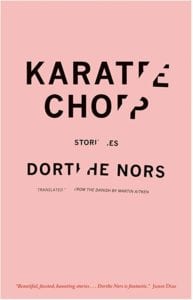
Dorthe Nors’ collection of concise, sharply observed short stories delve into human connections both beautiful and disturbing. Each story here is a masterpiece of writing.
Shelf Unbound: You are able to condense a novel’s worth of story and character development into your short stories. You’ve also written five novels. How do you approach writing a short story, as opposed to a novel.
Dorthe Nors: I don’t plan my writing. It is as if the writing emerges from within. That goes for both my novels and my short stories. The difference is, though, that you have to control the story line of the novel for a larger span of time. You go back and forth on themes, characters, composition and so forth. The short story is more like singing. I truly feel like I’m singing a song, when I write a short story: The voice has to be strong. I have to stay with the theme. I cannot be lazy at any point. Every note counts — and I prefer to write my stories in one take; that is — most of the structure is written in one attempt. Afterwards I adjust — but the singing (the writing) itself happens pretty quickly and without interruptions. Novels are in comparison oh so different to write.
Shelf Unbound: Is there anything about the Danish language that is difficult to evoke in an English translation?
Nors: I do think the kind of Danish I write in is pretty transferable into the English. I come from the part of Denmark that is called Jutland, and a lot of the Jutlandic dialect is related to English. But Danish only has 250,000 words. English has double that amount at least. That means that in Danish many words mean the same thing, and they change their meaning when they change their context. For instance “Kantslag” (the original Danish title for “Karate Chop”) means four different things in Danish. It means “karate chop,” but it’s also the word for “rimshot,” and for the chinks that you sometimes find on old china. On top of that it can also mean “the battle you undergo while being on the edge.” That’s of course hard to translate into the English. But that’s also a wonderful thing about my obscure little language —that it has all these double meanings. It’s also one of the reasons why the Danes are so incredibly ironic as a people. We say one thing. But we mean another.
Shelf Unbound: You seamlessly transition from mundane to fantastical and back. For instance, the girl licking envelopes with her brother at their father’s office, who then manically imagines disturbing scenarios of the men the letters are addressed to. The segment ends with: “She wanted to shake the man and ask if he had a car. Because if he had a car she wanted him to take her home. She didn’t want to be there anymore. She wanted to go home to her mother, but she couldn’t, because this man, who was nothing but a name on an envelope, had stuck to her …” The brother becomes alarmed, “and at that moment Louise remembers saying she didn’t care for the adhesive.” And then back to the mundane. When writing such scenes, do you start with the mundane or the fantastical?
Nors: Almost all of these stories are written from one end to the other. That is, in one take. Some of the stories have been created in a slightly different way, though. In a few of them I have had two interesting fragments that I for the fun of it have tried to put together to see what would happen. That is NOT the case with “Do You Know Jussi?” though. That story was written from one end to the other. But it’s not that mysterious. Our minds often start out in the mundane and then we drift into the realms of the subconscious and then we return to reality and so forth. I remember having licked envelopes when I was 10 (in a completely different context than the one described in the story). But what I remembered was looking at the envelopes and feeling estranged from the names on them. I took that memory and used it in a completely different scenario. But I did it without planning it. It just happened.
Shelf Unbound: Your first sentences are particularly masterful: “The Bangs work a lot and never shop for groceries themselves.” “It’s a year now since Allan moved out, and we had no children, though both of us were able.” “She started frequenting cemeteries that summer, preferring the ones others rarely visited.” How do you craft these intriguing first sentences?
Nors: Thank you so much. I’m really thrilled that you like my first sentences. They are very important. In a short story (and even more in short-shorts) you don’t have an entire chapter to frame the scene. It has to happen in one sentence — and I don’t plan them. I don’t know why this works for me, but I do think precision, accuracy and being to the point is the essence of good story writing and I also think you can’t construct your way through it. Again, it just happens. It emerges. It’s singing. It’s notes. If it sounds well — I let it stay there.
Shelf Unbound: Did you work with the translator Martin Aitken on the book’s translation?
Nors: Martin Aitken would translate these stories without my interference. Afterwards there would be small things that needed adjustment, but all in all the translation was done by him. I think he did a very good job on these stories. My novella “Minna Needs Rehearsal Space,” which has been bought by Graywolf Press along side my novella “Days,” was translated by American writer and translator Misha Hoekstra. We work closely together. Misha has the final call but I’m participating and it’s so much fun.
